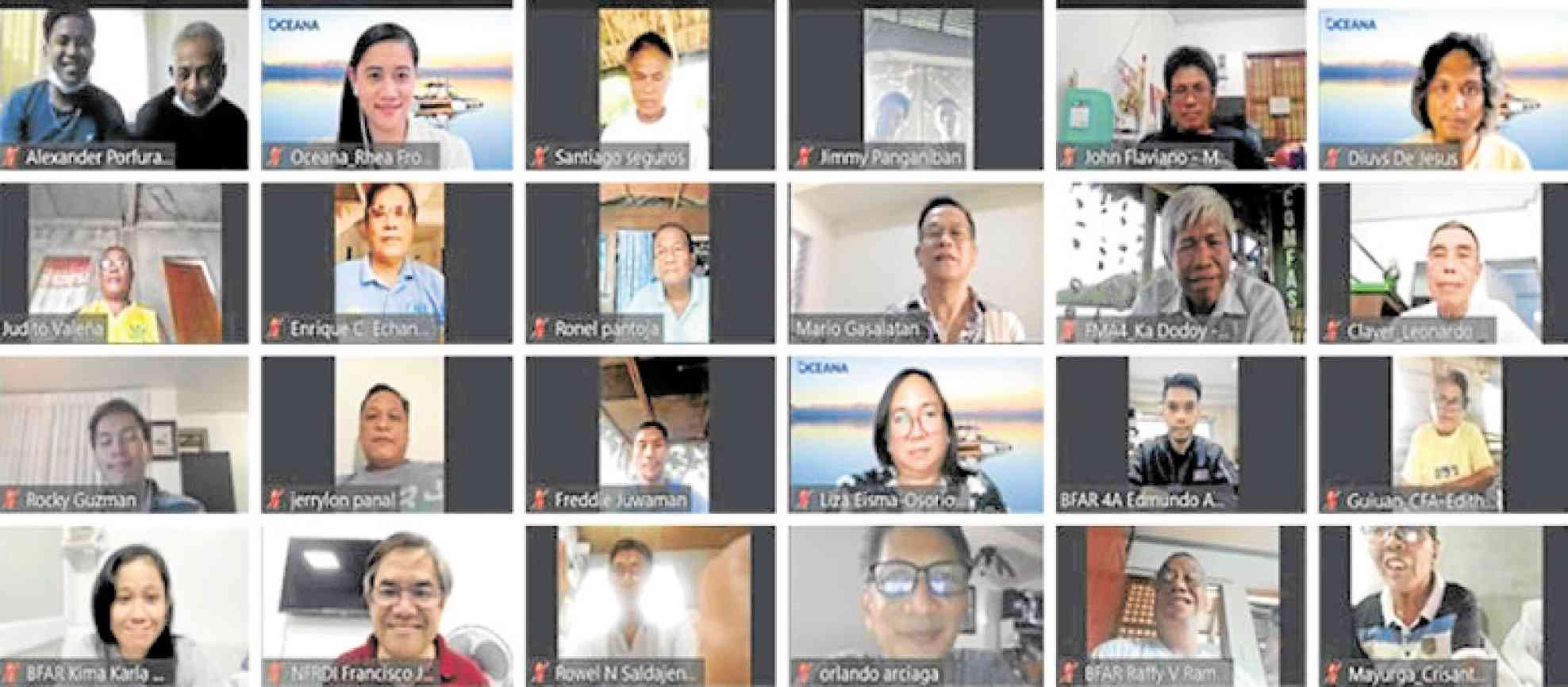Fisherfolk go back to school, take lessons on climate change

STAR STUDENTS Fisherfolk from different parts of the country virtually gather to attend Oceana’s digital classroom via Zoom where they are taught the value of fisheries management areas. —COURTESY OF OCEANA PHILIPPINES
As the effects of climate change are becoming even more acute, educating the country’s fisherfolk who are experiencing the phenomenon firsthand has taken on a new urgency.
This prompted marine conservation group Oceana Philippines to bring fishers from different communities together in a virtual classroom under the “Classroom for Fisherfolk” learning series. Here, they come to appreciate their important role in protecting the country’s fragile marine environment through the often overlooked Fisheries Management Areas (FMA) system. Under the FMA system, a management body issues science-based policies on the sustainable management of the country’s fisheries. It involves representatives from the Bureau of Fisheries and Aquatic Resources, national and local governments, sectoral members, civil society groups, and academic institutions. There are currently 12 FMAs in the country.
While warming waters and acidification of the country’s seas are difficult to address, the program hopes to stop human activities that contribute to the environment’s stresses including overfishing and illegal, unregulated, and unreported fishing.
“Oceana is excited to be pioneering the Classroom for Fisherfolk learning series to empower our fisherfolk by helping them gain a better understanding of their rights and responsibilities under our Constitution and fisheries laws, and the significance of their active participation in the sustainable management of our marine resources,” said Gloria Estenzo Ramos, vice president of Oceana.
“The classroom learning series benefits not just our fisherfolk but even those in the government. There is so much we can learn from our participants who spend more time out at sea than anyone else. This is a wonderful opportunity for an exchange of insights into pressing challenges … and discussions on how we can address these issues together,” she added.
Deep concern
Ramos said most fisherfolk who attended the earlier sessions expressed deep concern about the state of the country’s fisheries, and are keen to learn how they can help contribute to preserving the water’s resources for the generations to come.
They used to think that the country’s waters held infinite resources. But fishers now understand that they are not and that they are front-line stewards of nature’s bounty.
Robert “Ka Dodoy” Ballon, head of the Coalition of Municipal Fisherfolk’s Association in Zamboanga Sibugay and a recent Ramon Magsaysay laureate, also pushed for the inclusion of the women and youth in the succeeding classes.
Having been born to a fisherman father, Ballon understood and took to heart the value of the sea. Before “sustainability” became a platitude to signify eco-consciousness, Ballon and 30 other fisherfolk started Kapunungan sa Gamay nga Mangingisda sa Concepcion (Association of Small Fishermen of Concepcion) in 1986 to stop the rampant conversion of fishponds and the destruction of mangrove forests in his hometown. His work toward protecting the oceans has not stopped since.
Magsaysay awardee
The Ramon Magsaysay Award Foundation recognized Ballon for his “inspiring determination in leading his fellow fisherfolk to revive a dying fishing industry by creating a sustainable marine environment for this generation and generations to come, and his shining example of how everyday acts of heroism can truly be extraordinary and transformative.”
Oceana’s learning series began in June with about 15 fisherfolk from different parts of the country. As of September, the number of participants already swelled to 60. They were all provided an overview of the law and science behind the FMAs, the status and challenges in implementation, and the ways in which they can evaluate the performance of the FMA using the scorecard that Oceana and nongovernmental organizations developed.
“Majority of the fisherfolk still do not understand what the FMA system is,” Ballon said. “I hope that in the next sessions we can expand the discussions to include how this can benefit our environment, our livelihood, and the growth of the fisheries sector. This is for the next generation, so that they may understand why there are FMAs.”
Oceana said the Department of Agriculture (DA) must consider institutionalizing such efforts so that they can genuinely include small fisherfolk in crafting policies. Just like how the management of FMAs goes beyond political or legal jurisdictions and focuses instead on the range and distribution of fish stocks, the DA should also broaden its understanding of the industry and view it through the eyes of those who know it best, the country’s fisherfolk.